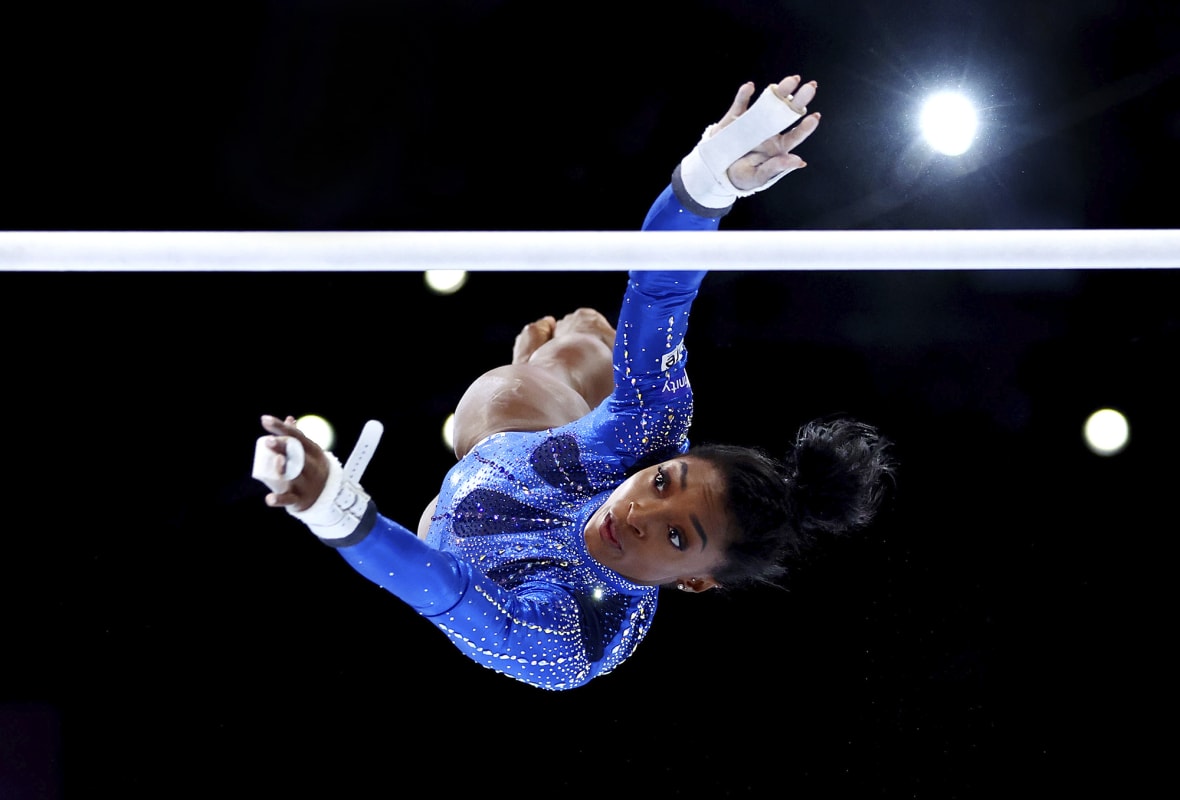The best part of Simone Biles’s 2023 is 2024.
When this year began, it seemed like we might never see the greatest gymnast of all time perform again. Biles had long been planning to end her career at the Tokyo Olympics, which the pandemic pushed to 2021. But when she developed a mental block called the twisties, which robbed her of her ability to locate herself in space and left her at risk of catastrophic injury, she had to pull out of all but one competition there. (She is Simone Biles, so even after fighting through the worst week of her career and stripping down her routine, she earned bronze on the balance beam.) On her post-Olympics tour, she performed only skills she could land safely. And then, for close to a year, she stayed away from the sport.

Naomi Baker/Getty Images
Gymnastics scared her, and it had stopped being fun. But in September 2022, she tentatively returned to the gym outside Houston, ostensibly to regain her fitness, but also to prove to herself that she could. She took off most of that October and November, then played around with some combinations last December.
“I really feel like [coach Laurent Landi] is always one step ahead of me,” she later said. “So every time I would come into the gym, he was like, ‘O.K., so I have some set routines for you.’ And I’m like, ‘What? I’m literally just trying to get in shape!’”
But by January, she was ready to return to practicing twice a day. In March, around the time she turned 26, she took her other coach—Laurent’s wife, Cécile—to dinner at a Mexican restaurant to discuss a return to competition.
“When [margaritas] get in the mix, who knows what you’re gonna say?” Biles recalled with a laugh. They decided that after her May wedding to Green Bay Packers defensive back Jonathan Owens, she would “go full force,” she said. “Kind of put life on hold.”
Almost before she knew it, she found herself outside Chicago in August for the U.S. Classic—her first competition in two years and two days—where she dominated. Then it was on to the national championships, in San Jose, Calif., three weeks later, where she dominated. Then to the world championships, in Antwerp, Belgium, in October, where ... you get it. In that stretch she became the first gymnast to win eight all-around U.S. titles and, in Belgium, her four gold medals—including her record-tying sixth in the all-around—and the silver she won gave her 37 medals at world championships and the Olympics, the most in history.
“I think I’m in better shape than I was in 2021,” she said. “Mentally and physically.”
But she worried that fans would not embrace her comeback. Within the gymnastics community she received plenty of support when she pulled out of the events in Tokyo, and many athletes thanked her for starting a conversation about pressure in sports. But there was no shortage of insults hurled at her online. So when every arena she entered sounded like a Taylor Swift concert, she was relieved.
“What shocks me the most is everyone’s so supportive,” she said at the U.S. Classic. “In the crowd, all the girls, all of the signs ... the outpouring of love and support that I had on Twitter, on Instagram and in the arena was just really shocking and surprising to me, that they still have so much belief in me, they still love me and it just makes my heart warm, because it’s nice to come out here and have all that support, especially in a time like this where I was really nervous to compete again. I can’t ask for more.”
Cue the speculation, which Biles did her best to dodge. After the U.S. Classic, she said, “It’s just like when you get married, they ask you when you’re having a baby. You come to Classics; they’re asking you about the Olympics.” At nationals, she said with a grin, “Y’all are kind of nosy sometimes.” Biles finally admitted in September that she plans to end her comeback in Paris next year. She will compete in one more Olympics, and she will do it on her terms.
At the worlds, Biles landed her Yurchenko double pike on vault, a move so challenging that no other woman has even attempted it in competition—and so dangerous that the International Gymnastics Federation has artificially lowered its score to discourage other gymnasts from trying it and hurting themselves. Biles once said she added it to her arsenal “because I can.” It has since become her fifth eponymous skill.
Once, that sort of legacy might have been enough for her. But she found another motivation as she returned to competition. At 26, nearly every time she does anything, she breaks an age record in a sport often populated by high schoolers. Biles was the oldest woman ever to win the all-around at nationals and the oldest U.S. woman to compete at the world championships in more than 50 years. She said with experience comes a smarter training regimen and a sharper sense of purpose. (“At this point, nobody’s forcing me out here,” she said. “This is truly me.”) And as the NCAA’s name, image and likeness policy has allowed some of her national team teammates to earn money while they compete in college, prolonging their careers, the face of gymnastics is beginning to change.
“I think having me and some of the other girls that are a little bit older, and seeing what we’re doing and being more mature physically and mentally in the gym, it just gives [young gymnasts] all the hope in the world that you don’t have to peak at 16,” she said. “Your time is still coming.”
Remarkably, so is hers.







